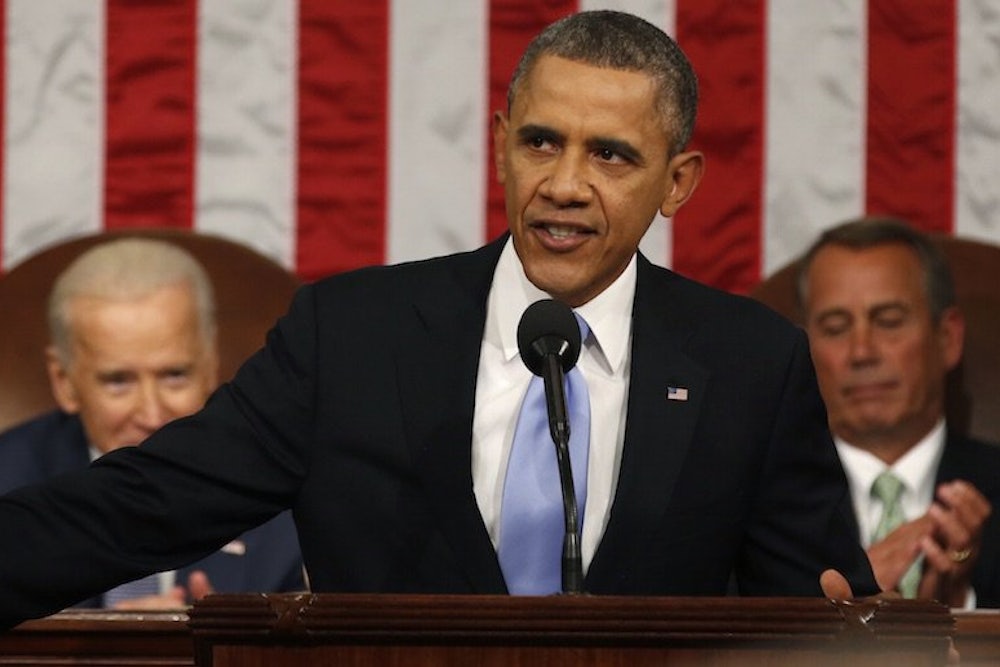In recognition of the fact that the State of the Union address, as typically imagined and delivered, is a historical anachronism, President Obama has been going around the country spoiling his own speech. Two hundred years later, it’s pretty easy for the president to occasionally apprise Congress of the state of the union (if that were really its sole purpose, he’d restore the practice of delivering written state of the union memos to Capitol Hill). But it’s hard as ever to focus Congress’ attention on anything. The State of the Union only really makes sense in 2015 as the crescendo of an advocacy campaign.
If Obama breaks news Tuesday night, it will be information withheld for some strategic purpose—perhaps where the element of surprise will create shock value in excess of any dividends he expects from dribbling out spoilers.
That’s not how you build support for most policy initiatives, like subsidizing community college tuition or taxing inherited wealth. You can’t marshal public sentiment by keeping things secret. It only makes sense when the intended audience isn’t the millions watching on television but the thousand-or-so people watching from inside the House of Representatives. And conveniently, all of the people who control the fate of Affordable Care Act subsidies will be in attendance.
The King v. Burwell challenge is an impressive blow for the preposterous idea that judges should scold legislators for exhibiting awkward statutory draftsmanship. The obvious venue for anyone genuinely concerned that the ACA text doesn’t technically authorize insurance subsidies in states that haven’t set up their own exchanges is Congress. With a single sentence, Congress could stipulate that the law does indeed authorize premium subsidies in exchanges established by both states and the federal government.
Congress only leaves this in the Supreme Court’s hands if it wants the Court to break Obamacare, and many Republicans in Congress openly admit that this is their hope.
The guardians of such things consider it rude and improper for the president to lecture or lobby the Supreme Court in a State of the Union address, as Obama did in 2010 when he scolded the justices for gutting campaign finance law. But Obama needn’t address the justices directly. Only legislators, and perhaps, the unsavory actors asking the Court to accomplish for them what they’ve failed to accomplish through political channels.
The two-part message would combine classic State of the Union positivity with a clear warning to conservatives to be careful what they wish for. First, the sensible proposition: Congress should take this issue out of the Court’s hands. It makes no sense to leave nine million insurance beneficiaries and the individual and small group health insurance markets in three dozen states facing tremendous uncertainty at the whim of the Court. If Congress were to pass a one sentence bill affirming what everyone knows, it would moot the case, and thus end the uncertainty.
To do this, Obama wouldn't have to say that the law should be changed substantively, only that its existing intent and meaning should be expressly affirmed. Without jeopardizing the government’s position, he could lament the fact that a cadre of conservative movement activists has seized upon a single phrase in the law, stripped from context, to wrest insurance away from millions through the courts. Why run that risk when Congress could guarantee relief with a single sentence?
For this request to have any force, though, Obama would have to stipulate that a one-sentence fix is the only acceptable solution to the problem conservatives are asking the Court to create. If the Court’s conservatives rule with the challengers, he will expect Congress to pass the same, simple bill, only under significant duress. That he won’t allow Congress to use the acute, Court-imposed suffering of millions to dramatically alter the ACA’s coverage scheme.
He can thus use the speech to alert Republican members of Congress who want the Court to do their bidding that it wouldn’t be doing their bidding at all—that the president is uniquely suited to wage the political fight that would ensue in the wake of an adverse decision from the Court, and that he would accept nothing less than complete victory. In so doing he would raise public consciousness about the threat and place conservative justices on notice that they wouldn’t be doing the right any favors by swallowing the tendentious argument in King. They would only be disgracing themselves.
